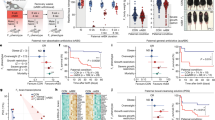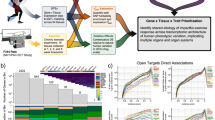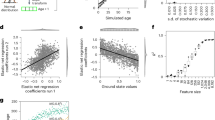Abstract
I AM not unmindful of the possible influence of environment in increasing the correlation of brothers. I strongly suspect that home influences have a good deal to do with the rather exaggerated value for the fraternal correlation in the category of conscientiousness. But certain characters, e.g. the cephalic index after three years of age, the eye-colour between twenty and thirty and the hair-colour from seven to fourteen are but little, in England at any rate, subject to environmental influence. The cephalic index remains almost constant throughout life. Now the mean value for the fraternal correlation for these three characters is 0.5161, and for stature, span, forearm and health, which might be supposed to be largely influenced by environment, it is 0.5179. It thus seemed to me that environment was not an important factor in modifying the correlation of the physical characters between brothers. In other words, environment does not influence the constant uniformly in one direction. This view was apparently appreciated by Prof. Cockerell when he wrote “the treatment of successive children is not the same.” Any influence of environment, strange as it may seem, was thus found to be negligible. Turning to the intellectual characters, my own a priori conception was that I should for the first time be able to distinguish between nurture and heredity. I expected much higher correlations in the case of temperament and probity than in that of physique. I was therefore somewhat surprised when the values came out much the same as in the case of the physical characters, say an average of 0.5. Of course it is open to Prof. Cockerell to say that 0.3 of this only is due to heredity and 0.2 to environment, or whatever other division appears to him probable, but he will then have to explain why the sum of the two makes 0.5, and why the influence of heredity is less in the intellectual than it appears to be for the physical characters. There is the obvious direct scientific interpretation which seems to me the true one, environment does not act in one direction in either case, and the mental and physical characters are inherited precisely at the same rate. To those who have taken the trouble, as I have done, to examine carefully the mental characteristics of a family at intervals of a century apart, so that we are not troubled by the co-environment peculiar to brothers, it is needless, perhaps, to urge the very strong inheritance of mental qualities. If Prof. Cockerell attributes it to his third factor, “pre-existing soul,” I should, indeed, be proud to have aided in the demonstration of its reality, although I fail entirely to see how it is to be done “by just such methods as Prof. Pearson employs.” Meanwhile most people will, I think, prefer to stick to heredity.
This is a preview of subscription content, access via your institution
Access options
Subscribe to this journal
Receive 51 print issues and online access
$199.00 per year
only $3.90 per issue
Buy this article
- Purchase on Springer Link
- Instant access to full article PDF
Prices may be subject to local taxes which are calculated during checkout
Similar content being viewed by others
Rights and permissions
About this article
Cite this article
PEARSON, K. The Inheritance of Mental Characters. Nature 65, 245–246 (1902). https://doi.org/10.1038/065245e0
Issue Date:
DOI: https://doi.org/10.1038/065245e0
Comments
By submitting a comment you agree to abide by our Terms and Community Guidelines. If you find something abusive or that does not comply with our terms or guidelines please flag it as inappropriate.



